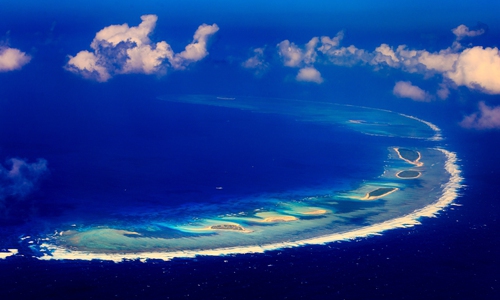HOME >> OPINION
Unity can thwart US designs in S.China Sea
By Chen Zinan Source:Global Times Published: 2019/12/2 20:33:40

Xisha Islands in the South China Sea Photo: VCG
Two US Navy warships, littoral combat ship USS Gabrielle Giffords and guided missile destroyer USS Wayne E. Meyer, trespassed into the waters of the Nansha Islands and the Xisha Islands in the South China Sea on November 20 and 21.The two vessels were carrying out the so-called freedom of navigation operations, challenging China's sovereignty over the South China Sea. China's People's Liberation Army Navy conducted the whole-process monitoring and verification on the two US warships and warned them to leave.
The US Navy's planned machinations cannot affect peace and stability in the South China Sea.
Washington is using increasing tactics to provoke Beijing in the region. Since the US conducted the first so-called freedom of navigation operations in the South China Sea in 2012, the US Navy has been increasing their frequency and scale in this regard.
The latest operation is the first time that the US sent a littoral combat ship to carry out a "freedom of navigation operation" in the South China Sea, and it is the first time the US challenged China's sovereignty in two different areas on two consecutive days.
The US has accused China of so-called excessive maritime claims, including "requirement that states provide notice or obtain permission prior to innocent passage through territorial sea," "excessive straight baseline claims" and "unclear, presumed illegal territorial sea." These clichés are Washington's explanation of the ambiguities in the United Nations Convention on the Law of the Sea based on US interests. The international community does not accept these.
The US is trying to disrupt the calm in the South China Sea, which further points to the need of maintaining regional stability there. Recently, countries in the South China Sea have made new progress in regional cooperation. By the end of October, China and the Philippines convened the first meeting of China-Philippines Inter-Governmental Joint Steering Committee on Cooperation on Oil and Gas Development, taking another solid step toward the two countries' joint maritime development. During the 22nd China-ASEAN (10+1) leaders' meeting on November 3, all parties felt encouraged by the progress in talks on the Code of Conduct for the South China Sea.
During the ASEAN-US ministerial meeting of the annual ASEAN Defense Ministers Meeting-Plus on November 17, US Defense Secretary Mark Esper warned bloc members not to allow the guidelines of the Code of Conduct for the South China Sea "to be manipulated" by China. After meeting Philippine Defense Secretary Delfin Lorenzana on November 19, Esper said that the US-Philippines Mutual Defense Treaty applies to the South China Sea.
While the current situation in the South China Sea is largely stable and most countries in the region are focusing on cooperation, the US is showing off its military might in the region and hyping up the so-called China threat theory. It is clear which country is maintaining stability and promotion cooperation, and which country is provoking confrontation.
Washington aims to instigate countries in the region to oppose China and to respond proactively to the US Indo-Pacific Strategy. Thus, what the US wants is to turn these countries into pawns to contain its so-called rival, and turns the South China Sea into an area of confrontation.
Countries should cooperate instead of compete in the South China Sea. Maintaining peace and stability in the water depends on joint efforts of countries in the region, and these countries are the biggest beneficiaries of the region's long-term security. Thus, certain countries in the region should get rid of their Cold War mind-set, say no to the interference by extraterritorial powers and jointly protect the hard-won stability in the South China Sea.
On the basis of consultation based on equality, countries in the region should improve regional governance mechanism and promote cooperation in various fields including energy exploitation and maritime rescue, so as to improve the well-being of all.
The author is an assistant research fellow with the Institute of Maritime Studies, China Institutes of Contemporary International Relations. opinion@globaltimes.com.cn
Posted in: VIEWPOINT